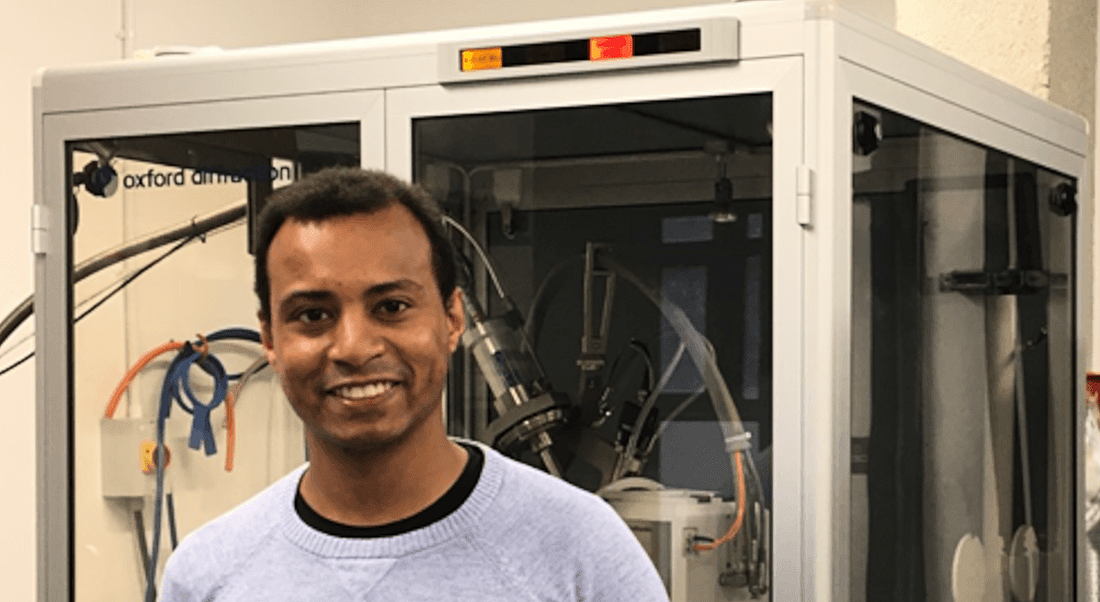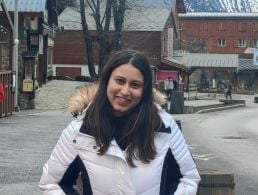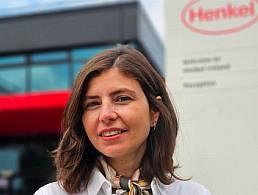SSPC’s Ahmed Ahmed explains what he has learned during his PhD – from new science skills to what the role of a researcher is really like.
When people think of scientists, the first image that comes to mind may be a lone researcher toiling away in a lab.
That’s what Ahmed Ahmed thought anyway, until he became a researcher in inorganic chemistry and discovered how much his work depends on colleagues and the wider scientific community.
Ahmed is now a PhD researcher at SSPC, the Science Foundation Ireland research centre for pharmaceuticals, based at NUI Galway’s School of Chemistry.
He tells us about his study of materials that could boost anti-cancer drugs, and what he loves about pursuing research.
‘I really enjoy research – being the first person to synthesise and study a particular material or compound is exciting’
– AHMED AHMED
What does your role entail?
I am a third-year PhD student, which means I carry out research. In particular, I look at the synthesis and characterisation of new materials.
What education and other positions led you to the role you have now?
I completed my bachelor’s degree in chemistry in 2017 and I undertook a research project in my final year.
This really stirred my interest in research so I pursued a research master’s degree afterwards. I continued to fall in love with research, particularly in inorganic chemistry, so I undertook a PhD.
Can you tell us about the research you’re currently working on?
I am currently working on the synthesis of a class of materials known as metal-organic frameworks (MOFs for short). They are crystalline porous hybrid materials with a lot of applications.
My main interest is in their biomedical applications – essentially, we use them as carriers for drugs to improve the drug performance. I make new MOFs, study their properties and test their ability to carry different drugs. I primarily focus on encapsulating anti-cancer drugs to improve their stability and performance.
What first stirred your interest in this area?
I have always had an interest in biology and chemistry, so the chance to work at the interface of the two was very attractive to me.
It offered me the opportunity to continue developing some of my chemistry skills and also develop a wider range, as I didn’t get to do as much biology in my undergraduate as I wanted.
If there is such a thing, can you describe a typical day for you?
I usually begin my day by checking up on crystallisations I set up the previous day. Based on what I observe, I then plan what experiments I need to carry out that day.
Afterwards I usually read some papers or do some writing. Although not every day is the same, there are sometimes meetings with collaborators or conferences to attend too.
What skills and tools do you use on a daily basis?
I use a wide range of skills as my project is very diverse. For example, I use typical chemist’s tools such as infrared spectroscopy, UV-spectroscopy as well as material and biological tools such as microscopy and gas sorption.
What applications do you foresee for this research?
As the project itself is very application driven, I see the potential for MOFs to be used in a clinical environment. Although the field is still relatively new, promising results are continuously published.
When you first started work as a researcher, what were you most surprised to learn was important in the role?
I guess I had the misconception that scientists were these highly knowledgeable people working alone. So I was very surprised to discover how much we depend upon not just members of our research group or faculty but the wider scientific community.
For example, SSPC has been a massive help to me, allowing me to collaborate with a wide group of researchers from different fields including computational chemists, biologists, etc.
What do you enjoy most about your career in research?
I really enjoy research – being the first person to synthesise and study a particular material or compound is exciting. Not to mention when you finally overcome an issue that has been bothering you for weeks!
Don’t miss out on the knowledge you need to succeed. Sign up for the Daily Brief, Silicon Republic’s digest of need-to-know sci-tech news.




